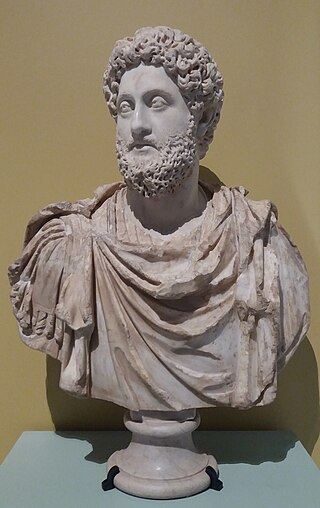
Commodus was a Roman emperor who ruled from 177 to 192. He served jointly with his father Marcus Aurelius from 177 until the latter's death in 180, and thereafter he reigned alone until his assassination by Narcissus. His reign is commonly thought to mark the end of a golden age of peace and prosperity in the history of the Roman Empire.

Legio II Traiana, was a legion of the Imperial Roman army raised by emperor Trajan, along with XXX Ulpia Victrix, for the campaigns in Dacia. Records of the II Traiana Fortis have been recovered from Egypt dating to the middle of the 5th century. The legion's emblem was the demi-god Hercules.
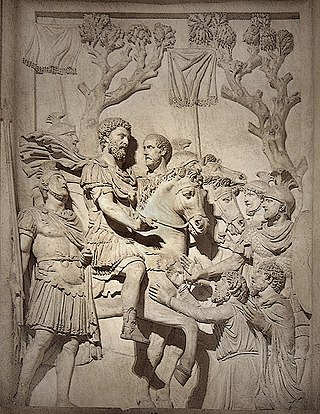
Tiberius Claudius Pompeianus was a politician and military commander during the 2nd century in the Roman Empire. A general under Emperor Marcus Aurelius, Pompeianus distinguished himself during Rome's wars against the Parthians and the Marcomanni. He was a member of the imperial family due to his marriage to Lucilla, a daughter of Marcus Aurelius, and was a key figure during the emperor's reign. Pompeianus was offered the imperial throne three times, though he refused to claim the title for himself.
Gaius Avidius Cassius was a Syrian Roman general and usurper. He was born in Cyrrhus, and was the son of Gaius Avidius Heliodorus, who served as praefectus or governor of Roman Egypt, and Julia Cassia Alexandra, who was related to a number of royal figures, including her descent from both Augustus and Herod the Great. He began his military career under Antoninus Pius, rising to the status of legatus legionis. He served during the Parthian war of Lucius Verus, in which he distinguished himself, for which he was elevated to the Senate, and later made Imperial legate. During the Bucolic War, he was given the extraordinary title of Rector Orientis, giving him Imperium over all of the eastern provinces of the Roman Empire.
Marcus Statius Priscus Licinius Italicus was a Roman senator and general active during the reigns of Hadrian, Antoninus Pius, and Marcus Aurelius. Contemporary sources refer to him as Marcus Statius Priscus or simply Statius Priscus. He was consul for the year 159 as the colleague of Plautius Quintillus; Priscus was one of only two homines novi to attain the ordinary consul in the reigns of Antoninus Pius and Marcus Aurelius.
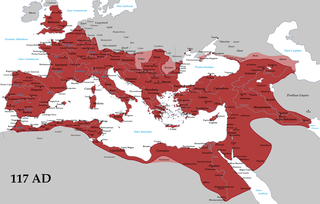
The Kitos War was one of the major Jewish–Roman wars (66–136). The rebellions erupted in 115 when most of the Roman armies were fighting Trajan's Parthian War on the eastern border of the Roman Empire. Major uprisings by Jews in Cyrenaica, Cyprus and Egypt spiralled out of control, resulting in a widespread slaughter of the remaining Roman garrisons and Roman citizens by Jewish rebels.
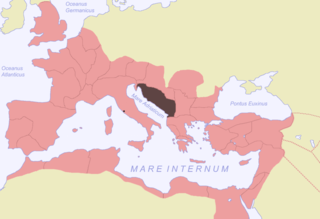
Illyricum was a Roman province that existed from 27 BC to sometime during the reign of Vespasian. The province comprised Illyria/Dalmatia in the south and Pannonia in the north. Illyria included the area along the east coast of the Adriatic Sea and its inland mountains, eventually being named Dalmatia. Pannonia included the northern plains that now are a part of Serbia, Croatia and Hungary. The area roughly corresponded to part or all of the territories of today's Albania, Kosovo, Montenegro, Serbia, Bosnia and Herzegovina, Croatia, and Slovenia.

The Province of Sardinia and Corsica was an ancient Roman province including the islands of Sardinia and Corsica.
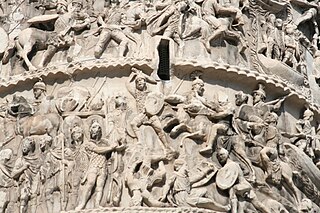
The Marcomannic Wars were a series of wars lasting from about 166 until 180 AD. These wars pitted the Roman Empire against principally the Germanic Marcomanni and Quadi and the Sarmatian Iazyges; there were related conflicts with several other Germanic, Sarmatian and Gothic peoples along both sides of the whole length of the Roman Empire's northeastern European border, the river Danube.

Quintus Labienus Parthicus was a Roman general in the Late Republic period. The son of Titus Labienus, he made an alliance with Parthia and invaded the Roman provinces in the eastern Mediterranean which were under the control of Mark Antony. He occupied the Roman province of Syria together with the Parthians in 40 BC. He then pushed into southern Anatolia, still with Parthian support. The main Parthian force took charge of Syria and invaded Judea. Both Labienus and the Parthians were defeated by Publius Ventidius Bassus, who recovered these provinces for Mark Antony.
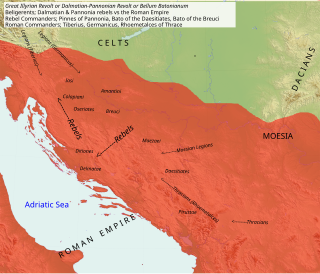
The Bellum Batonianum was a military conflict fought in the Roman province of Illyricum in the 1st century AD, in which an alliance of native peoples of the two regions of Illyricum, Dalmatia and Pannonia, revolted against the Romans. The rebellion began among native peoples who had been recruited as auxiliary troops for the Roman army. They were led by Bato the Daesitiate, a chieftain of the Daesitiatae in the central part of present-day Bosnia and Herzegovina, and were later joined by the Breuci, a tribe in Pannonia led by Bato the Breucian. Many other tribes in Illyria also joined the revolt.

The history of the Roman Empire covers the history of ancient Rome from the fall of the Roman Republic in 27 BC until the abdication of Romulus Augustulus in AD 476 in the West, and the Fall of Constantinople in the East in AD 1453. Ancient Rome became a territorial empire while still a republic, but was then ruled by Roman emperors beginning with Augustus, becoming the Roman Empire following the death of the last republican dictator, the first emperor's adoptive father Julius Caesar.

The wars of Augustus are the military campaigns undertaken by the Roman government during the sole rule of the founder-emperor Augustus. This was a period of 45 years when almost every year saw major campaigning, in some cases on a scale comparable to the Second Punic War, when Roman manpower resources were stretched to the limit. This period also saw expansion through diplomacy and annexation, without the direct use of military force. The result was a major expansion of the empire that Augustus inherited from the Roman Republic, although the attempted conquest of Germania ended in defeat despite the enormous deployment of resources involved. As a result of these campaigns, the Roman Empire assumed the borders it would hold, with a few modifications, for its entire history.

Nerva was Roman emperor from 96 to 98. Nerva became emperor when aged almost 66, after a lifetime of imperial service under Nero and the succeeding rulers of the Flavian dynasty. Under Nero, he was a member of the imperial entourage and played a vital part in exposing the Pisonian conspiracy of 65. Later, as a loyalist to the Flavians, he attained consulships in 71 and 90 during the reigns of Vespasian and Domitian, respectively. On 19 September 96, Domitian was assassinated in a palace conspiracy involving members of the Praetorian Guard and several of his freedmen. On the same day, Nerva was declared emperor by the Roman Senate. As the new ruler of the Roman Empire, he vowed to restore liberties which had been curtailed during the autocratic government of Domitian.

The reign of Marcus Aurelius began with his accession on 7 March 161 following the death of his adoptive father, Antoninus Pius, and ended with his own death on 17 March 180. Marcus first ruled jointly with his adoptive brother, Lucius Verus. They shared the throne until Lucius' death in 169. Marcus was succeeded by his son Commodus, who had been made co-emperor in 177.
The gens Appia was a plebeian family at Rome. Its nomen, Appius, is a patronymic surname based on the praenomen Appius. The gens does not appear to have been very large, and few of its members achieved great importance.
The gens Avidia was an ancient Roman family that flourished during the early centuries of the Empire. Several of its members rose to prominence during the late first and second centuries AD.
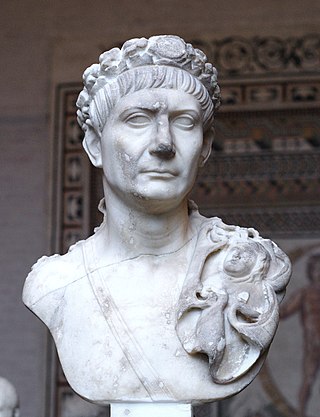
The gens Ulpia was a Roman family that rose to prominence during the first century AD. The gens is best known from the emperor Marcus Ulpius Trajanus, who reigned from AD 98 to 117. The Thirtieth Legion took its name, Ulpia, in his honor. The city of Serdica, modern day Sofia, was renamed as Ulpia Serdica.

Roman Empire is a television docudrama based on historical events of the Roman Empire. The show is in the anthology format with each season presenting an independent story. Season 1, "Reign of Blood", is a six-part story about Emperor Commodus. Jeremiah Murphy and Peter Sherman collaborated on writing the first season, with Richard Lopez directing. It premiered on Netflix on November 11, 2016. Season 2, "Master of Rome", premiered on July 27, 2018; it is a five-part story about the rise of Dictator Julius Caesar and the fall of the Roman Republic. Season 3, "The Mad Emperor", premiered on Netflix on April 5, 2019, and is a four-part story about Emperor Caligula.
The Siege of Apamea was a failed attempt by the Caesarians near the end of Caesar's Civil War to capture the rebel city of Apamea, Syria Secunda. Lucius Statius Murcus and Quintus Marcius Crispus led the attempt to capture the city, while Equite Quintus Caecilius Bassus led the defence of the city.














